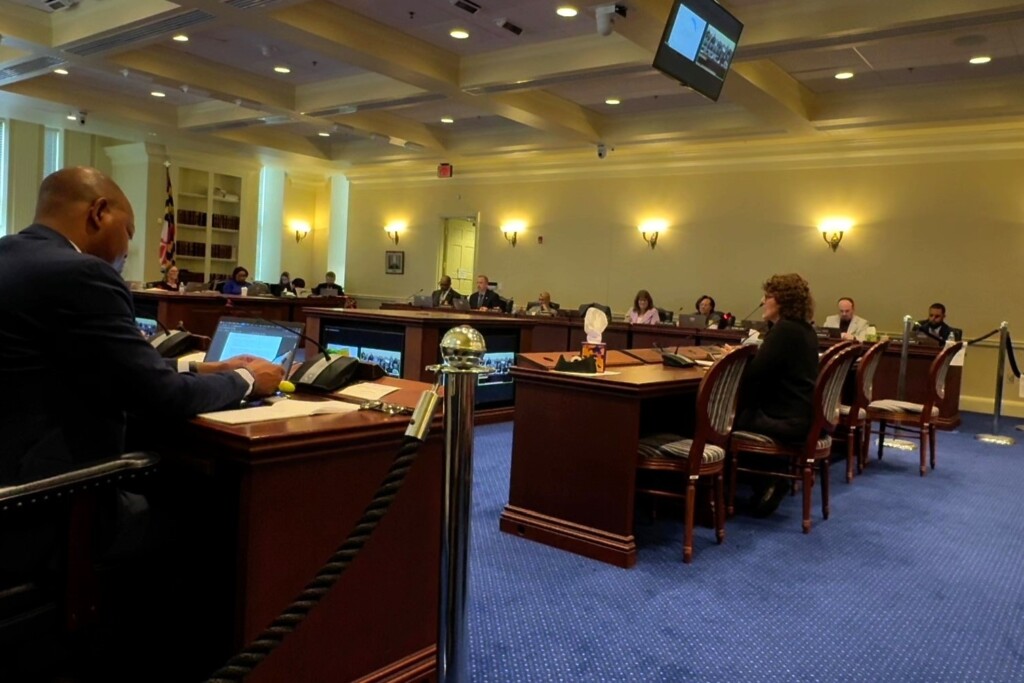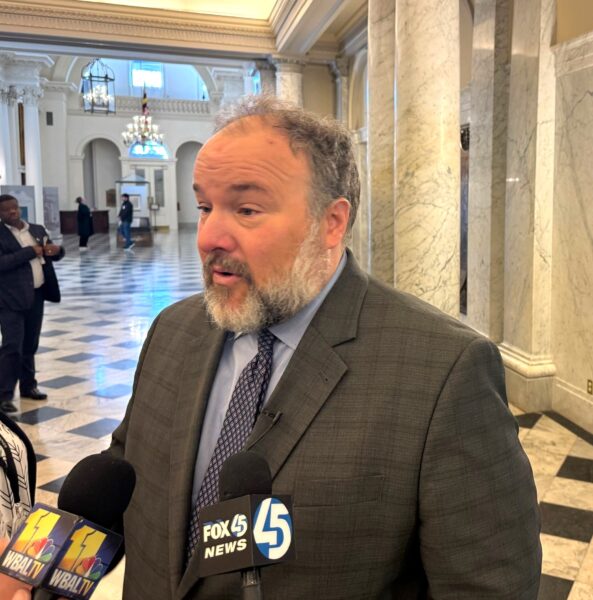
A House committee voted Monday to advance a correctional ombudsman bill, which some legislators and criminal justice reform advocates have pushed for at least three years.
The House Judiciary Committee voted to advance Senate Bill 134, sponsored by Sen. Shelly Hettleman (D-Baltimore County), to the full chamber.
With about a week left in the 90-day legislative session, the committee also voted to conform the House version of the bill, sponsored by Del. Debra Davis (D-Charles), to the Senate measure.
Because the measure is jointly assigned, the Health and Government Operations Committee must also review and recommend the legislation to the House floor.
A major change from last year’s bill would create an Office of the Correctional Ombudsman as an independent operation in state government.
According to the bill, the ombudsman’s office would conduct independent reviews and assessments of various programs administered by the state Department of Public Safety and Correctional Services such as health and mental health services and educational and vocational programs, and resolve conflicts with a person incarcerated, an employee, or a contractor with the agency.
The ombudsman’s office would also be allowed to interview correctional personnel, or a person incarcerated, and make unannounced visits and on-site inspections of facilities.
In addition, the measure would give the office subpoena power for “any individual to appear to give sworn testimony or produce documentary evidence that is reasonably necessary to carry out the office’s duties.”
Under current law, the state’s Commission on Correctional Standards, which is within the department of corrections, determines if a correctional facility hasn’t met “minimum mandatory standards” such as food services, housing, sanitation and safety.
Several problems at Maryland’s prisons have become public in recent years.
In May 2023, the attorney general’s office announced that 15 people had been indicted for smuggling fentanyl, methamphetamines and other items into the Roxbury Correctional Institution in Hagerstown.
Two months later, the Board of Public Works voted to approve a $13 million settlement following allegations of unpaid wages for state correctional employees. The settlement was the result of an investigation that the U.S. Department of Labor started in 2018.
“It is time for transparency and accountability,” Hettleman said.
The bill has support from Attorney General Anthony Brown (D) and Maryland Public Defender Natasha Dartigue. Both reiterated their support in a letter dated Thursday, which they wrote in their roles as co-chairs of the Maryland Equitable Justice Collaborative, which launched in October to try and end mass incarceration.
The letter represented the group’s first public position on any policy. The message was sent to Gov. Wes Moore (D), Department of Juvenile Services Secretary Vincent Schiraldi, DPSCS Secretary Carolyn J. Scruggs and the General Assembly’s presiding officers.
“The establishment of a Correctional Ombudsman Office would provide desperately needed independent oversight of Maryland’s correctional system and ensure the safe and humane treatment of those incarcerated, working for, or under the supervision of DPSCS,” Brown and Dartigue wrote. “Establishing a Correctional Ombudsman Office is real action we can take now that would bring us closer towards ending the mass incarceration crisis in our State.”
A few changes
The Senate approved the bill unanimously March 15, but on Monday, the House Judiciary Committee voted on a few amendments presented by that panel’s chair, Del. Luke Clippinger (D-Baltimore City).

Del. Luke Clippinger (D-Baltimore City) speaks with reporters in the State House on March 29, 2024. Photo by William J. Ford.
One provision would increase membership of a Correctional Ombudsman Advisory Board from 10 to 12 people. The two additional people would be those with experience managing a large government agency. In addition, no person on the board may be employed by the Department of Public Safety and Correctional Services who holds a supervisory position.
Another amendment added 45 days for the corrections department to respond to a complaint from the ombudsman’s office. The previous number was 30 days.
Clippinger, a prosecutor in the Anne Arundel County state’s attorney’s office, said his primary amendment would earmark $1 million for the ombudsman office in fiscal year 2025. It would come from a fund balance through the federal Justice Reinvestment Act, which provides drug treatment programs, support for non-violent offenders with mental and behavioral health needs and other services.
Money needed for fiscal year 2026 and beyond would come from the state’s general fund, “where it should be in the first place,” Clippinger said.
Although the majority of the committee voted in favor of this amendment, a few people expressed concerns.
“Are you confident with even diverting these funds that there’ll be an adequate amount of funding for drug treatment [and other services]?” Del. Aaron M. Kaufman (D-Montgomery) asked Clippinger.
“I feel OK with one fiscal year. I absolutely don’t if it goes any further than that,” Clippinger said.
Del. Jon S. Cardin (D-Baltimore County) said it’s possible more funding may be requested in the future, or the ombudsman’s office would need to reduce its operations.
“While I think that this office is a great idea and it may both be self-sufficient and be really good at efficiency and creating things,” he said, “I am not sure that we should set it up in a way that it may find itself gasping for oxygen in 365 days.”
According to the revised legislative analysis and fiscal note, the bill would cost at least $628,800 next fiscal year to fund an ombudsman’s office that includes about $529,000 for five positions: two investigators, a correctional ombudsman, an assistant attorney general, and an administrative aide.
The remaining funding would be for contractual services for $30,000; rental space at $32,670; and other operating expenses at nearly $37,000.
The state’s Department of Legislative Services notes funding for the office would increase to $849,700 in fiscal year 2026 and up to $914,000 in fiscal year 2029.
`The office can apply for federal sources and grants and if approved, less state money would be needed.
If the legislation is approved by both chambers and signed or allowed to become law by Moore, Maryland would join several other states including Hawaii, Michigan, New Jersey and Virginia that created correctional ombudsman offices.




 Creative Commons Attribution
Creative Commons Attribution